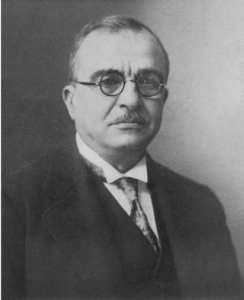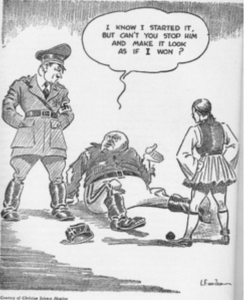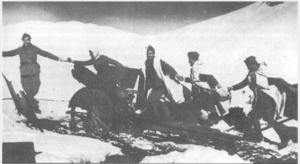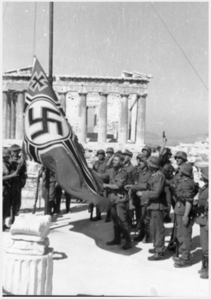
The Battle For Greece
It is well known that Mark Twain said “History does not repeat itself, but it rhymes,” while writing “The Celebrated Jumping Frog of Calavaras County.” This was an 1865 English rewriting of an ancient Greek-language frog tale set in classical Greece, two or three thousand years old. All these facts are well known.
And yet, none of those well-known facts are correct. The truth is that after Twain published his own story, he read another version of his story written as a Greek folk tale. Twain thought this was where he got his idea. However, the Greek “folk tale” was written by a contemporary author based on Twain’s own story.
Upon mistakenly thinking he had plagiarized the Greek tale, instead of the other way around, Twain noted that “no occurrence is sole and solitary, but merely a repetition of a thing which had happened before, and perhaps often.” This actual quote is quite the opposite of the “history does not repeat itself” quote.
The mystery of the modern Greek folk tale which is not an ancient Greek folk tale is yet unsolved, because in another book published in 1971, another quote is attributed to Twain – “the trouble with history is that while historians repeat each other, history never repeats itself.”
And so we have the history of Greece, never perfectly repeating itself, but with no occurrence sole and solitary; a repetition of a thing which has happened before and perhaps often. Greece, which was ruled by a fascist-admiring military dictator at the outbreak of WWII, but which stood against the Axis powers at great personal and national cost, buying other Allied countries time to organize, build armaments, and prepare for a relentless Nazi invasion. How did a Greek dictator who modeled himself after Plato, and simultaneously banned “Plato’s Republic” come to play such a pivotal role in world history?

To understand the Battle of Greece, one must look at Greek Republic History. The First Hellenic Republic, after Greek independence from Ottoman rule, ran from 1822 to 1832, ending after the Great Powers of Europe established Bavarian Prince Otto as the Greek King. The Second Hellenic Republic came 92 years later, with the fall of the Greek Monarchy in 1924. The Republic was birthed from defeat on the battlefield – the royalist forces were defeated by the Turkish military in 1922, which caused a Greek military revolt and eventually a national vote to form a republic. The Second Republic was likewise short-lived. Europe in the interwar years was a violent and chaotic place. Events in Great Power countries and endemic corruption at home, including electoral fraud, caused the Greek population to agains shift their position and reject representative republican government, welcoming right-wing dictator Ioannis Metaxas into power.
Metaxas was a military man, born of an aristocrat family, who looked down on his common-born countrymen. Educated at the Hellenic Military Academy, and later the Berlin War academy, he was a great admirer of the Greek Monarchy and simultaneously Prussian Militarism. He fought with distinction during the Balkans Wars. When WWI followed on the heels of those conflicts, Metaxas has achieved a high position in the Greek military, and argued for neutrality. HIs political posturing led him to clashes with the Greek government, and eventually into exile in Corsica during the interwar years. The massive rift created by the conflicts between Metaxas and the government became known as the National Rift.
Although not a politician, and possibly due to the fact that he was not a politician, Metaxas returned to Greece and gained the ear of King George II. Metaxas was, after all, a royalist, and the restoration of the monarchy had been his goal for decades. When George II finally regained the throne in 1935, Metaxas rejoined the government at the head of a small right wing party. In election in 1936, the Greek Communists won enough seats to be a nuisance, and on Soviet COMINTERN orders, acted as a spoiler, allying with the Liberal Party to try and dethrone the Monarchy again. George II acted decisively in support of his right-wing loyalist followers, and in a series of political moves appointed Metaxas Prime Minister. This resulted in massive riots and unrest in Greece starting on 29 April 1936, amplified and exacerbated by the Communists. Metaxas wasted almost no time, declaring a state of emergency on the 4th of August 1936, and launched a coup against what was essentially the Greek government. It is important to note Metaxas was the Prime Minister, so he launched a coup against his own government.

After seizing power, Metaxas launched a wave of repression which stunned Greeks. He arrested political enemies, rewrote the school curriculum, and banned books, including Plato’s Republic. This move earned him the reproach “Stupid, was well as vicious,” from visiting scholar Arthur Koestler in 1938, since Metaxas dictatorial government was supposedly modeled on Greek philosophy, including Plato’s Republic. In truth, Metaxas modeled his state on Mussolini’s Italy, complete with torture and police brutality, but also instituting workplace safety, the 8-hour work day, and creation of a Social Insurance Institute which would endure to the current day.
At the start of WWII, both the Axis and Allies Powers courted Greece, hoping to gain a massive foothold in the Mediterranean Ocean. Metaxas stayed neutral, knowing Greece was in an untenable strategic position. Finally, Mussolini issued an ultimatum to Metaxas on 28 October 1940. Despite Metaxas’ admiration of Mussolini, the Greek dictator was unwilling to give free access to Greek strategic sites to the Italian dictator – famously responding with a simple “no” (Ohi) to the proposal. Mussolini used that as a pretext to launch the Greco-Italian War the same day.

The Italian military was unprepared for the fighting, and failed at every turn. Within 6 months, the Greeks were capturing Albanian territory from the Italians, and in March 1941, the Italians stopped attacking. The Greeks won, but had weakened their defenses significantly. Most importantly they had used up most of their war supplies, only being sustained by the British. In return, Metaxas allowed the British to use Crete as a base in the Mediterranean. This base, combined with the possibility of the Allies using Greek airbases for attacks on Germany oil production, meant that Adolph Hitler had to act against Metaxas quickly. But Hilter’s planning and Metaxas failing health meant the two would never meet as enemies. Metaxas passed away on 29 January 1941, from toxemia caused by phlegm of the phalanx. The war would go on without Metaxas.

The German Army was allied with the Bulgarians, who offered free passage for the Nazi war machine to attack Greece, but the Greek/Bulgarian border was protected by the Metaxas Line, fortifications named for the dictator himself. Instead, the Germans wanted to attack through Yugoslavia, and were temporarily prevented from doing so diplomatically, but were aided by a coup in Yugoslavia which allowed Hitler to disavow his previous promises and launch an attack on 6 April 1941.
The Greeks were as well prepared as they could have been. The British deployed 62,000 Imperial troops to augment the 430,000 man Greek Army. The weakness of the Allies was in manpower, because they stood against a combined German-Italian Axis juggernaut of 1,250,000 soldiers, but the Axis also brought 1,400 tanks and 1,200 aircraft. The allies only had 120 tanks and 300 aircraft of their own. The Greeks strength was their terrain. The Metaxas Line itself consisted of a series of pillboxes and fortifications in difficult to access mountainous areas. The mountains between Bulgaria and Greece on Greece’s Eastern Border were unnavigable in good conditions; they were almost impregnable when defended by experienced Greek soldiers. The weak part of the defense was on Greece’s Northwest border with Yugoslavia. The Greeks and Yugoslavs had friendly relations before the war, so the Metaxas Line did not extend to that portion of the border. Additionally, the terrain there was rough, but not as bad as the other areas. Armored units and large trucks could be moved over the wider mountain roads with difficulty, but it was not impossible.
The German attacked as predicted, smashing Yugoslav and Greek defenses and driving into Thessaloniki on 9 April 1941, 3 days after the offensive started. Thessaloniki was the second largest Greek city, and a strategic port valuable to both sides. British reinforcements to Greece flowed through the port. The German offensive had to contend with a portion of the Metaxas Line, which was stubbornly defended by the outnumbered Greeks. After suicidal attacks against the fortified position failed, the Germans used a combination of artillery and dive bombers to reduce the forts to ruins and kill the Greek defenders. The German 6th Mountain Division also did what was deemed impossible, and crossed a 2,000 meter high mountain range to cut the rail line to Thessaloniki. Many major forts did not surrender until ordered to by their command. Many smaller, more isolated forts held out for days longer, buying time for an Allied retreat.
As the Axis Armies were attacking Belgrade and pushing into central Greece, the Greek and Yugoslav Armies were trying to defeat the Italians in Albania. The Allied offensive advanced well, defeating several Italian units, but it was for naught, because the collapse of Allied lines in other areas forced fighting withdrawals in Albania. By 13 April, the Albanian campaign was over, with Allies all along the lines in full retreat, trying to avoid German encirclement. The Yugoslav Air Force was particularly effective in supporting both attack and retreat, but on 15 April 1941 was practically destroyed during an attack by Italian bombers. Italian and German attacks continued on the outnumbered and surrounded Greek units in Albania. They were prevented from rejoining the defense of the Greek mainland and whittled down by constant attacks. On 20 April 1941, the Green Epirus Army surrendered to the Germans, if only to deny the Italian military a final victory.
The secondary allied defensive line at Monastir Gap fared little better than the Metaxas Line. German Panzer and SS units achieved multiple breakthroughs, overwhelming defenders and capturing cities. British-led New Zealand troops briefly held the Germans at the Olympus and Servia passes, but after being flanked and eventually surrounded, executed a fighting withdrawal. On 18 April 1941, Tempe Gorge and Pines Gorge was over, these German victories allowed the forward German elements to capture the British Airfield at Larissa with loads of supplies on 19 April 1941. These supplies further allowed the German to continue their advance, chasing the British to the Port of Volos on 21 April 1941, where retreating British troops had embarked onto boats and again abandoned fuel and oil for the Germans to use.
On 26 April 1941, Athens Radio made their famous announcement:
You are listening to the voice of Greece. Greeks, stand firm, proud and dignified. You must prove yourselves worthy of your history. The valor and victory of our army has already been recognized. The righteousness of our cause will also be recognized. We did our duty honestly. Friends! Have Greece in your hearts, live inspired with the fire of her latest triumph and the glory of our army. Greece will live again and will be great, because she fought honestly for a just cause and for freedom. Brothers! Have courage and patience. Be stout hearted. We will overcome these hardships. Greeks! With Greece in your minds you must be proud and dignified. We have been an honest nation and brave soldiers.

On 27 April 1941, German units entered Athens. They drove straight to the Acropolis and raised the Nazi flag. The British retreat and evacuation were sorely hampered by Luftwaffe attacks. Dozens of troop ships were sunk with a massive loss of British lives. Germans captured 8,000 Imperial troops during the retreat. Greece was divided up amongst the Bulgarians, Germans, and Italians.
The Greek Government, including George II evacuated to Crete, which was attacked by German paratroopers on 20 May 1941, and evacuated by the British 4 days later. The German paratroopers suffered horrendous casualties, destroying them as a fighting force, even as they captured the island.
The final result was a total loss of Greece to the Allies, and total victory for the Axis. Historians differ on the affects of the German Balkan Campaign on Operation Barbarossa, the Nazi attack on the Soviet Union. Some argue that the logistics weren’t in place in time, no matter what happened in the Balkans, but others argue that a diversion of 1.2 million Axis troops into a different part of Europe, as well as the destruction of the entire German paratrooper corps would have been bound to delay the start of the invasion, and therefore allow the Russian Winter to help defeat the Nazi forces. The historians that argue for the delay assisting the Soviets point to Hitler’s statement to Leni Riefenstahl – If the Italians hadn’t attacked Greece and needed our help, the war would have taken a different course. We could have anticipated the Russian cold by weeks and conquered Leningrad and Moscow. There would have been no Stalingrad.
We will never know what would have happened to the Soviet Union if there had been no Battle of Greece in 1941. But we do know that the brave Allied defenders who fell weakened the Axis war machine protecting their families. Their fates might have been cruel, but they are not forgotten – their sacrifices helped save the world from barbarism and evil. They gave their tomorrows for our todays.
- October 24, 2020
- Greece
